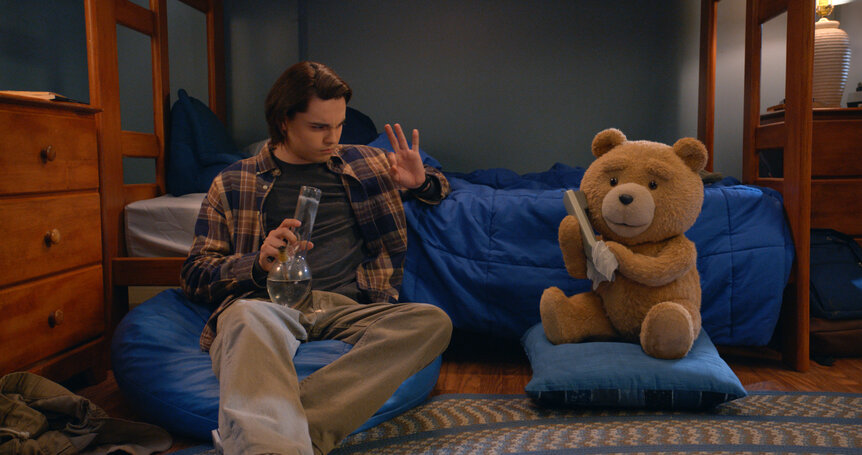
In the latest installment of Seth MacFarlane’s franchise, “Ted” makes an unexpected return in a prequel series on Peacock, taking viewers on a haphazard journey back to the 1990s. The seven-episode season explores the earlier days of Ted and his human friend John, offering a mix of crude humor, nostalgic references and attempts at familial depth.
The show’s premise revolves around a 16-year-old John Bennett and a Ted past his Hollywood heyday. The chemistry between Max Burkholder’s John and MacFarlane’s Ted remains a highlight, providing a glimpse into the origins of their enduring friendship. The visual effects for Ted are surprisingly good for television, and Burkholder’s performance holds its own against the raunchy teddy bear’s antics.
While the show attempts to infuse humor into the familial dynamics, it often falls into the trap of tired stereotypes and predictable scenarios. The characters, including John’s parents Matty and Susan and cousin Blaire, engage in politically incorrect banter and awkward situations, attempting to navigate the blurred lines between edgy humor and social commentary.
The series, set in the 90s, leans heavily on nostalgia, incorporating references to pop culture artifacts from the era. However, this reliance on callbacks only sometimes contributes to the show’s overall appeal, feeling more like a checklist than a meaningful exploration of the time period.
“Ted” struggles with its format, opting for a binge-friendly release on Peacock. The brevity of the season, with episodes often exceeding the 30-minute mark, leaves little room for substantial character development or overarching narrative. The pacing issues become apparent as the show tries to cram in as many crude jokes as possible, sacrificing depth for quick laughs.
The exploration of friendship and growing up, while present, lacks the depth needed to elevate the series beyond a mere comedy. John’s family dynamics are introduced but have yet to be fully explored, leaving potential character development on the table. The emotional beats, while genuine, often feel formulaic and fail to leave a lasting impact.
While the series retains MacFarlane’s signature brand of dry humor and irreverence, it occasionally ventures into territory that feels more desperate than daring. Efforts to push boundaries with explicit language and mature themes often come across as formulaic rather than groundbreaking.
Despite its shortcomings, “Ted” prompts genuine laughs in moments of absurdity and out-of-pocket scenes. The show’s success lies in embracing its own ludicrous premise and not taking itself too seriously. Alanna Ubach’s portrayal of Susan is a comedic gem, injecting much-needed energy into the family dynamic.
Much like its predecessor, the original ‘Ted’ movie, and MacFarlane’s renowned series Family Guy, the success of ‘Ted’ (2024) hinges heavily on the audience’s individual taste for comedy and their tolerance for dark humor. As Shakespeare astutely observed, ‘A jest’s prosperity lies in the ear of him that hears it, never in the tongue of him that makes it.’ This timeless insight underscores the subjective nature of humor, emphasizing that the effectiveness of a joke lies in the reception of the audience, making it clear that ‘Ted’ caters to those with a particular comedic inclination and an appreciation for the darker side of humor.
In conclusion, “Ted” (2024) is a hit-and-miss experience that relies heavily on nostalgia, crude humor, and the enduring chemistry between a boy and his foul-mouthed teddy bear. While it may appeal to fans of MacFarlane’s previous work, the series struggles to break new ground and falls short of recapturing the magic of the original “Ted” film.
Ted is currently streaming on Peacock. You can check out the trailer here.


